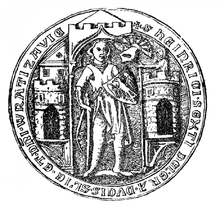Henry VI. (Silesia)
Henry VI. (also: Heinrich the Good ; * March 18, 1294 ; † November 24, 1335 ) was Duke of Breslau from 1311 until his death .
family
Heinrich came from the Silesian family of the Silesian Piasts . His parents were Duke Heinrich V († 1296) of Liegnitz and Breslau and Elisabeth († 1304), daughter of Duke Boleslaw of Kalisch . Heinrich had the following siblings:
- Boleslaw III. († 1352), Duke of Liegnitz and Brieg
- Wladislaus († 1352), initially canon in Breslau; later married a daughter of Duke Boleslaw II of Mazovia
- Hedwig, married to Otto, son of Margrave Otto V of Brandenburg
- Eufemia, married to Otto von Kärnten
In 1310 Heinrich married Anna († 1327), daughter of the German King Albrecht I , widow of Margrave Hermann von Brandenburg, who died in 1308 . The marriage to Heinrich had three daughters:
- Elisabeth († 1328), married Duke Konrad I of Oels († 1366) in 1322
- Euphemia († after 1383), married before 1325 Duke Boleslaw I of Falkenberg († ~ 1361–1365)
- Margarethe († probably 1379), abbess of the Wroclaw Poor Clare Monastery
Life
After the early death of his father in 1296, his brother Bolko I was appointed guardian of Heinrich and his underage siblings. Since Bolko I died in 1301, the guardianship of the Bohemian King Wenceslaus II took over , who thus gained further influence in Silesia.
After King Wenzel's death in 1305, Heinrich's older brother Boleslaw took over the government of his duchy for his younger brothers under the tutelage of Bishop Heinrich von Würben from Breslau . In 1311 the paternal inheritance was divided. Heinrich was assigned to Breslau, which only consisted of the districts of Breslau and Neumarkt . Boleslaw received the Duchy of Brieg- Grottkau , the younger Wladislaus received Liegnitz. Since Breslau was rated higher, Heinrich had to pay a sum of money to both of them. Heinrich and Wladislaus soon got into disputes with Boleslaw, who was constantly trying to expand his power and reduce the legacy of his brothers. Wladislaus had to cede Liegnitz to him, and he asked Heinrich to swap countries, which Heinrich refused.
As a loyal supporter of the Habsburgs , Heinrich undertook a campaign as far as the Rhine in 1314 to defend his brother-in-law's claim to the throne, Frederick the Fair . In the debate over the legacy of the late 1321 Oelser Duke Boleslaw of Glogau , Henry agreed with his brother Konrad I, with whom he married his daughter Elizabeth. With the promise of his return to Konrad, Heinrich Oels received a pledge and a lifelong usufruct for Prausnitz and Trachenberg . Because of the quarrels with his brother Boleslaw, Heinrich did not keep this promise. On April 20, 1324 he gave his land as a fief to the German King Ludwig the Bavarian , with whom he was reconciled shortly before. Ludwig promised him the female succession for Heinrich's daughters and their mother, but did not protect him against the claims of Heinrich's brother Boleslaw. Therefore, Heinrich concluded an alliance with the Teutonic Order in 1326 , which was directed primarily against the Polish King Władysław I. Ellenlang . At the urging of the city of Breslau, however, shortly afterwards he turned to the Bohemian King John of Luxembourg , to whom he transferred his duchy as a fief on April 6, 1327. At the same time he granted him the right of inheritance in the event that he ( Heinrich ) should die without a male heir. King Johann immediately returned his duchy to Heinrich for lifelong usufruct and, out of gratitude, also granted him the lifelong usufruct of the Glatzer country .
Since Heinrich, like most of the Silesian dukes, opposed the levying of St. Peter's penny as a per capita tax, he was excommunicated from 1319-1321 and his country was interdict .
Heinrich was generously supported by the city of Breslau during his reign, to which he granted a number of privileges . Three months before his death, the Trenčín Treaty was signed , with which the Polish king solemnly renounced any claim by Poland to Silesia. As a result, Heinrich's Duchy passed into the possession of the Crown of Bohemia without any contradiction . Heinrich died as the last Piastic Duke of Breslau. His body was buried in the Clarisse monastery there.
literature
- Colmar Grünhagen : Heinrich VI., The last Duke of Breslau . In: Allgemeine Deutsche Biographie (ADB). Volume 11, Duncker & Humblot, Leipzig 1880, p. 613 f.
- Josef Joachim Menzel: Heinrich VI .. In: New German Biography (NDB). Volume 8, Duncker & Humblot, Berlin 1969, ISBN 3-428-00189-3 , p. 397 f. ( Digitized version ).
- Historical Commission for Silesia (Ed.): History of Silesia. Volume 1: Ludwig Petry , Josef Joachim Menzel, Winfried Irgang (eds.): From primeval times to the year 1526. 5th, revised edition. Thorbecke, Sigmaringen 1988, ISBN 3-7995-6341-5 .
Web links
| personal data | |
|---|---|
| SURNAME | Henry VI. |
| ALTERNATIVE NAMES | Heinrich the Good |
| BRIEF DESCRIPTION | Duke of Wroclaw |
| DATE OF BIRTH | March 18, 1294 |
| DATE OF DEATH | November 24, 1335 |

